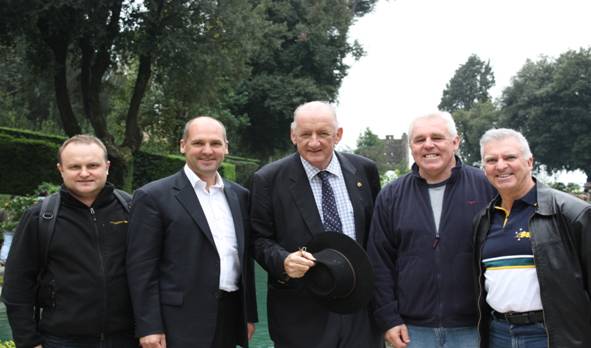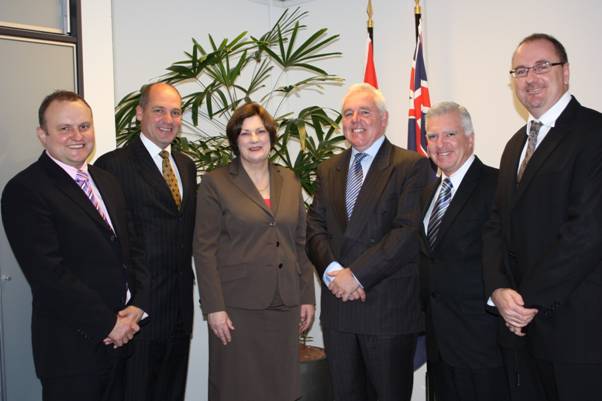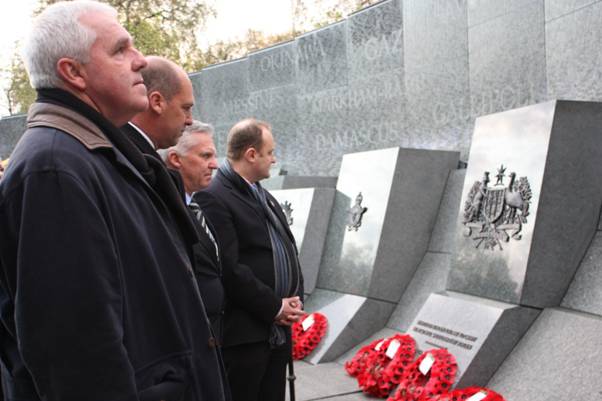Navigation: Previous Page | Contents | Next Page
CHAPTER 1
Background to the delegation
1.1
During the 41st Parliament, the Parliamentary Joint Committee
on the Australian Crime Commission (the committee) inquired into the future
impact of serious and organised crime on Australian society. That inquiry found
that Australia faces an increased threat from serious and organised crime and from
transnational crime, and that while a number of agencies and legislative
arrangements are in place, these in themselves, may not be wholly effective in
addressing the threat.
1.2
In May 2007, the then Minister for Justice and Customs, Senator The Hon.
David Johnston, wrote to the committee indicating that he sought to ensure
that:
Australia's legislative framework for disrupting and
dismantling serious and organised crime groups continues to be as up to date
and effective as possible.[1]
1.3
The Minister proposed that the committee consider legislation adopted in
Canada, the United Kingdom and the Netherlands to:
examine the relative merits of the approaches adopted in
these different jurisdictions, [as] any insights that can be gained as to the
practical workings of the laws in these countries, and the extent to which
these overseas models and this overseas experience is likely to be applicable
to serious and organised crime as it manifests itself in Australia.[2]
1.4
The committee considered that the Minister's request would be a valuable
exercise but due to the election in November 2007 there was no opportunity to
undertake this study. Consequently, the committee chose to make a
recommendation in its 2007 report, which kept this issue on the committee's program
of work in the next Parliament:
Recommendation 6
The committee suggests that the Parliamentary Joint Committee
on the Australian Crime Commission in the next term of the Federal Parliament
conduct an inquiry into all aspects of international legislative and
administrative strategies to disrupt and dismantle serious and organised crime.[3]
1.5
In the 42nd Parliament, the committee agreed to undertake an
inquiry into legislative arrangements to outlaw serious and organised crime
groups. The full terms of reference of this inquiry are provided at Appendix A.
The committee developed a specific term of reference to facilitate the
Minister's request to examine current international approaches to disrupt and
dismantle serious and organised crime groups:
The committee will examine international legislative
arrangements developed to outlaw serious and organised crime groups and
association to those groups and the effectiveness of these arrangements.
1.6
In October 2008, the committee wrote to the then Minister of Home
Affairs, the Hon. Bob Debus, seeking his support for the committee and to hold
meetings with the Royal Canadian Mounted Police in Canada, Europol in the
Netherlands and the Serious and Organised Crime Agency in the United Kingdom.
The Minister supported the committee's proposal and the matter was then
referred to the Prime Minister for his support and approval.
1.7
In February 2009, the committee received Prime Ministerial approval to
hold meetings with the Royal Canadian Mounted Police, Europol and the Serious
and Organised Crime Agency. The committee also received a further request from
the Minister of Foreign Affairs, the Hon Stephen Smith, to engage with the
United Nations Office on Drugs and Crime in Vienna, Austria, and the United
Nations Interregional Crime and Justice Research Institution in Rome, Italy. The
committee considered this additional request from the Minister of Foreign
Affairs and agreed that it would undertake the additional travel. A full
program of meetings is listed at Appendix B.
The objectives of the delegation
1.8
Parliamentary delegations in support of committee inquiries serve several
purposes, including the following:
- To contribute to the Parliament’s understanding of the issues involved
in the inquiry
- To enhance awareness in Australia and in the countries visited of
the inquiry
- To provide opportunities for Australia’s official representatives
in subject countries to meet with and lobby high level officials, politicians
and parliamentarians in those countries
- To facilitate high level contacts between Australian parliamentarians
and overseas officials, politicians, parliamentarians, business leaders and
others for the purposes of the inquiry.
1.9
The primary aim of this delegation was to facilitate a better
understanding of the approaches developed to disrupt and dismantle serious and
transnational organised crime within each international jurisdiction. Consequently,
the delegation program was developed in consultation with, and on advice from,
the Australian Federal Police, the Australian Crime Commission, and the
Attorney-General's Department, to capture the following information in each
country visited:
- What is the nature and extent of organised crime domestically?
- What is the nature and extent of transnational crime within the
jurisdiction?
- What are the key domestic agencies targeting organised crime and
how do they operate?
-
What are the partnership arrangements with other sectors
domestically, and with other overseas jurisdictions and international
organisations, to target organised crime?
- What are the key legislative instruments or programs which target
domestic organised crime (including proceeds of crime arrangements, police
powers, criminal law) and how successful are they?
- What are the key legislative instruments or programs which target
transnational crime and how successful are they?
- Does any jurisdiction use 'control orders', or something similar,
as a means of limiting crime group membership? What are the benefits of this
approach and what are the difficulties in using such an approach?
1.10
This delegation report aims to report on the range of information gained
during the delegation, and identify key issues and trends in approaches to
combating organised crime. It does not make recommendations in relation to
these issues. The report for the committee's inquiry into legislative
arrangements to outlaw serious and organised crime groups will be a broader and
more thorough account of all evidence obtained during the course of the inquiry.
The inquiry report will develop further the key issues identified in this delegation
report. This delegation report should be viewed as a supplement to the report
of the committee's inquiry into legislative arrangements to outlaw serious and
organised crime groups, which will be published later in 2009.
Acknowledgements
1.11
Many people greatly assisted the delegation in a variety of ways to
ensure its success. The Delegation expresses it appreciation to all those
involved. In particular, the Delegation would like to record it thanks to the
following organisations and individuals.
The Australian Federal Police
1.12
The Australian Federal Police (AFP) greatly assisted with both the
development of the delegation program and in assisting delegation members in
various international locations.
1.13
In Canberra, delegation members would like to acknowledge the great
efforts and assistance provided by members of the Border and International
Branch, Assistant Commissioner Tim Morris, Commander Paul Osbourne, and Ms Jody
Chapman and her team. In particular, the delegation wishes to thank Ms Chapman
who worked tirelessly to coordinate the delegation program.
1.14
The delegation is also extremely appreciative of the assistance, and
good humour, provided by AFP Senior Liaison Officers in the countries and
regions which the delegation visited. In particular:
- Federal Agent Gerry Morris in Ottawa and Washington
- Federal Agent Mark Dokmanovic in Rome
- Federal Agent Peter Bodel and Federal Agent Ray Imbriano in The
Hague
- Federal Agent Chris Lines in London.
1.15
The Delegation was extremely impressed with the professionalism of these
officers and with the high regard in which the AFP is held internationally.
Department of Foreign Affairs and
Trade
1.16
The Delegation would like to acknowledge the assistance provided by Australia's
embassies in the countries to which the Delegation travelled. The Delegation
notes that Australia's interests are well served internationally by the
officers of the Department of Foreign Affairs and Trade.

Delegation Members with H.E.
Tim Fisher, Australia's Ambassador to the Holy See, Italy
1.17
In particular the Delegation wishes to thank:
- H.E Amanda Vanstone, Ambassador to Italy for her generosity
during the Delegation's time in Rome and for making available embassy staff to
assist the Delegation. The Delegation wishes to thank Ms. Lee Holloway, Third
Secretary, DFAT.
- H.E Peter Shannon, Ambassador to Austria for his generosity
during the Delegation's time in Vienna, for hosting a meeting with senior
Europol officers and for making available embassy staff to assist the
Delegation. The Delegation wishes to thank Mr Simon Mamouney, Third Secretary,
DFAT.
- H.E. Lydia Morton, Ambassador to the Netherlands for her
generosity during the Delegation's time in the Hague and for hosting a meeting
with senior Dutch law enforcement officers.

Delegation Members with H.E.
Lydia Morton, Australia's Ambassador to the Netherlands, and Federal Agent
Peter Bodel, AFP
- H.E Tim Fisher, Ambassador to the Holy See, for his generosity of
his time and his knowledge.
- H.E Justine Brown, High Commissioner to Canada for hosting a
meeting with senior Canadian law enforcement officers.
- H.E. John Dauth, High Commissioner to the United Kingdom for
meeting with the Delegation.
- Mr David Stuart, Deputy Chief of Mission United States of America
for meeting with the Delegation.
The Australian Crime Commission and
the Attorney-Generals Department
1.18
The Delegation would like to record its thanks to those officers of the
Australian Crime Commission (ACC) and the Attorney-General's Department (AGD) who
assisted with preliminary briefings. In particular, the Delegation acknowledges
the assistance of Mr Craig Harris and Mr Hamish Hansford from AGD, who provided
advice based upon their own examination of international law enforcement
agencies.
Parliamentary Officers
1.19
The Delegation acknowledges the assistance provide by officers of the Parliamentary
Relations Office.
1.20
The Delegation would also like to acknowledge the work of the secretariat
staff of the Parliamentary Joint Committee on the Australian Crime Commission,
who greatly supported the organisation and preparation of the delegation
program and the production of the delegation report.
ANZAC Day Commemorations
1.21
The Delegation was fortunate enough to be in London on 25 April 2009 and
was able to commemorate ANZAC Day.

Delegation Members laying a wreathe at the ANZAC Day Dawn
Service, Australian War Memorial, London, United Kingdom
1.22
At least 2,000 people attended the Dawn Service. The large crowd that
attended the service is indicative of the strong support that Australians and
New Zealanders, around the world, show in the observance of this day of
Remembrance.
1.23
In particular, the Delegation was delighted that boys from Canberra Boys
Grammar School Chamber Choir, were in London to sing at the ANZAC Day
ceremonies.
Navigation: Previous Page | Contents | Next Page
Top
|